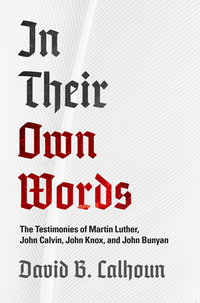 In Their Own Words: The Testimonies of Luther, Calvin, Knox and Bunyan
In Their Own Words: The Testimonies of Luther, Calvin, Knox and Bunyan
by David B. Calhoun
Paperback, 232 pg.
Banner of Truth, 2018
Read: January 13 – 27, 2018

I liked this book — don’t get me wrong. I’d even recommend it heartily to people. But I have some issues with it.
Let’s look at the book blurb, shall we?
| Hundreds of biographies have been written of Martin Luther, John Calvin, John Knox and John Bunyan. But there is something unique to be gained by listening to these men tell their stories in their own words. |
Right there? I’m sold — great idea for a book. What’s more, this is from Banner of Truth — this kind of thing is in their wheelhouse. Who wouldn’t want to read this kind of thing?
| Here, in In Their Own Words, is a collection of testimonial statements drawn from the writings of Luther, Calvin, Knox, and Bunyan. We see men who candidly confessed their sins and boldly testified to the grace, mercy, and goodness of God to them. Their testimonies illustrate the great truth stated by Paul that ‘where sin abounded, grace abounded much more, so that as sin reigned in death, even so grace might reign through righteousness to eternal life through Jesus Christ our Lord’ (Rom. 5:20-21). |
The key word there, is “statements.” I had visions of extended portions of the works of these men. Which seemed odd to me at least in Calvin’s case, as he’s notorious for not talking about his life (as is seen in this book, I should add). But still, that’s what it sounded like to me. But by and large we’re talking a sentence or two of quotation to be followed by Calhoun discussing more about his subject on whatever topic/time period he’s looking at. Sometimes we get a paragraph — sometimes a couple consecutive paragraphs. Sometimes it’s less than a sentence. Really there’s a lot more David Calhoun than I expected. I don’t have a detailed analysis, but I’m pretty sure that the text is 55-65% Calhoun (and a few biographers he quotes), with the remainder by the subjects.
This doesn’t diminish the work by Calhoun — it’s no easy feat finding these snippets and then assembling them into a coherent narrative. But still …
My other issue is the inclusion of Bunyan. He doesn’t fit thematically, or even historically. Also, despite really trying — repeatedly for almost two decades — I can’t muster up that much enthusiasm for him. This is a personal flaw of mine, I realize. But that’s that.
Now, the content of the book? It’s really good — linking these mini-biographies (50-60 pages per subject) to biographical remarks is a great idea, and adds a perspective you don’t normally see. Calhoun is able to focus on the parts of their lives that they cared more about, rather than whatever the prevailing interests of scholars are.
We get good, concise views of their lives, with a lot of flavor of the subjects — their concerns, their thoughts, even some of their personality. A good investment of time — I learned some things, I found some inspiration in some of the words — and relished Calhoun showing the Providential care shown to each of these men.
Read this, think about it — just don’t go in expecting to get saturated by the words of these figures and you’ll enjoy it more than I did.
—–



